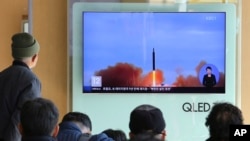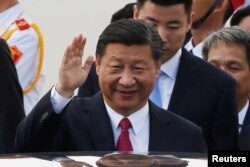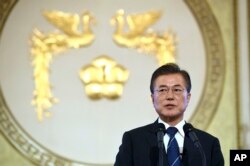Analysts say issues surrounding North Korea and tensions on the peninsula will be a top priority when South Korean President Moon Jae-in visits China next week.
Pyongyang recently tested what is believed to be its largest and most powerful ballistic missile, an ICBM experts estimate is capable of reaching as far as the east coast of the United States. The threat of a possible nuclear war is casting a cloud over South Korea’s hosting of the Winter Olympics and the United Nations is debating a new round of sanctions.
For China and South Korea, the meetings between the two countries' leaders will also be an opportunity to give the relationship a fresh start.
Relations soured earlier this year after South Korea deployed a U.S.-made missile defense system to help shield itself from a possible attack from the North. China believes the system is a threat to its own security and rolled out punishing economic sanctions on Seoul in response.
Those sanctions impacted trade and tourism and some of South Korea’s biggest companies, including Lotte, which owned land that was used for the deployment of the Terminal High Altitude Area Defense missile system.
Shen Dingli, a political science professor at Fudan University in Shanghai, said that while meetings will seek to smooth over that lingering dispute, finding ways to bring stability to Northeast Asia will take priority.
“The North Korea nuclear issue is a threat to both South Korean and China. Any disagreement between China and South Korea would be playing into North Korea’s hands,” Shen said.
Shen said Beijing would be looking to Seoul to do more to keep Washington in check, particularly when it comes to the possibility of the use of military force. Shen said that China is not opposed to the use of force in response to an attack, but opposes any pre-emptive action.
“Chairman Xi will definitely tell Moon Jae-in that South Korea plays a key role in stopping the U.S. from making the first move. South Korea, not China, plays that key role,” Shen said.
Bong Young-shik, a political analyst with the Yonsei University’s Institute for North Korean Studies in Seoul, said there’s a great sense of urgency about a possible war triggered by unilateral military action by the United States or by accident.
“In that regard, China and South Korea are on the same page, to give a diplomatic solution a last chance,” Bong said.
During his visit, which begins next Wednesday, President Moon may reconsider South Korea’s strategic position between China and the United States to deal with the growing North Korean nuclear and ICBM threat.
The liberal South Korean leader has advocated dialogue and engagement polices to reduce regional tensions that Beijing supports, while also aligning closely with the United States’ hard-line position on strong economic sanctions and military deterrence.
Bong said Moon could express a degree of support for China's and Russia’s freeze-for-freeze proposal to suspend both the U.S./South Korea joint military exercises and North Korea’s nuclear and missile tests.
“I think there is growing preference inside the Moon Jae-in government to give it a try to (support) China’s proposal to have the simultaneous suspensions,” said Bong.
Cheng Xiaohe, an associate professor at Renmin University’s School of International Studies, said that given that the South Korean government is very close to Beijing, the two are likely to focus on ways to avoid the use of military force and restart talks during meetings next week.
“This is a very important meeting. An opportunity (for both countries) to get more in sync,” Cheng said. The meeting will be a chance to understand “if there are talks (with North Korea), what should be discussed, sanctions and what should come next. And if there is a military strike what kind of strike would be considered.”
A new round of sanctions is currently being discussed at the United Nations and if it has not passed before Moon visits, Cheng said China will be looking to coordinate with South Korea on that as well.
In the wake of North Korea’s most recent ICBM launch, the United States has been calling on China to cut off oil exports to Pyongyang. But that is a move Beijing worries could lead to social and political instability or even military conflict.
















